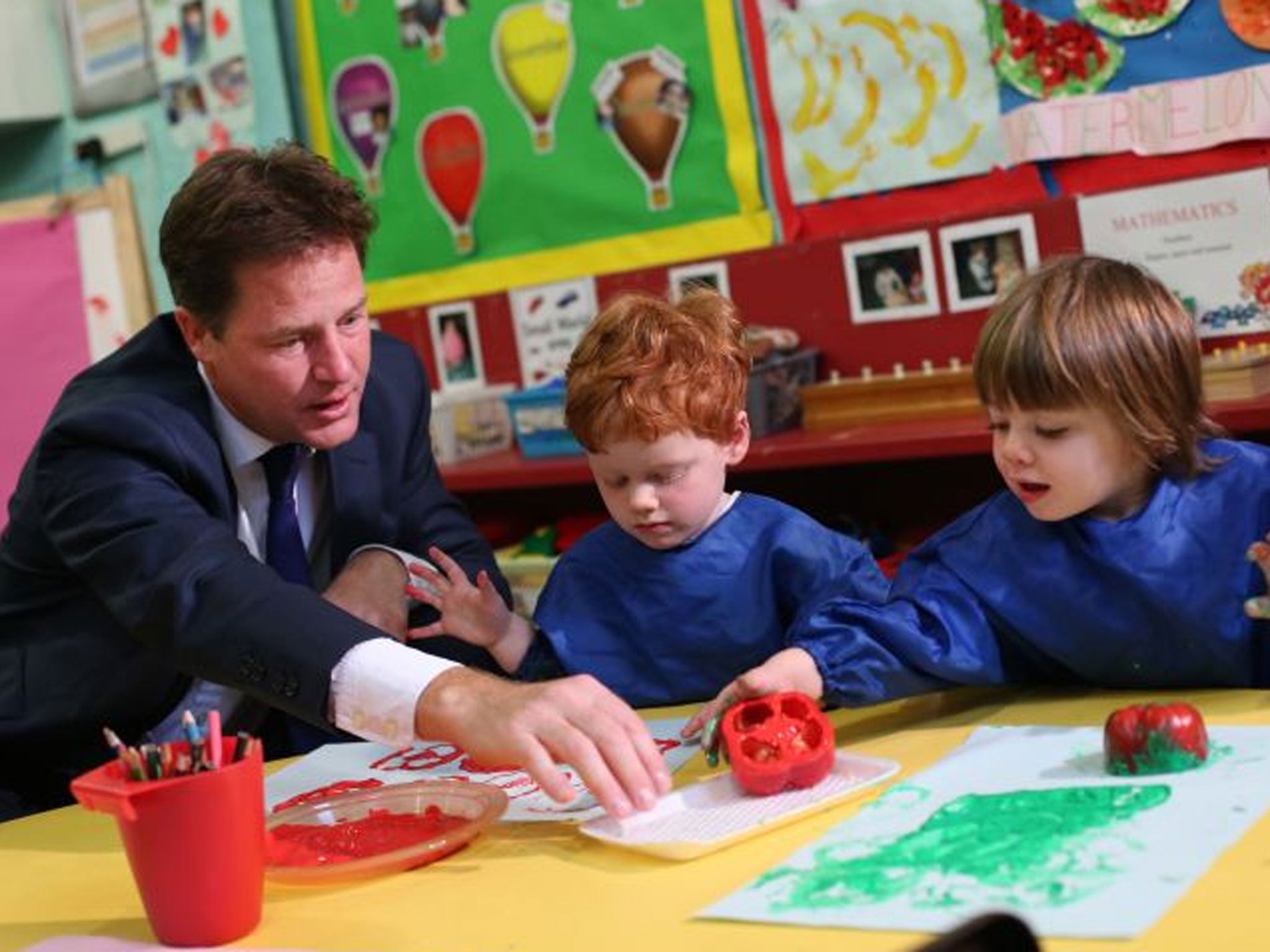More free childcare to aid economy, says Nick Clegg
Getting mothers back to work is on the agenda at the Lib Dem conference

Ademand for free childcare to be extended to one-year-olds, in order to bridge the costly gap between maternity leave and affordable nursery provision, is on the agenda at the Liberal Democrats' party conference this week.
Toddlers aged between one and two would get 10 free hours of nursery every week, under the plan likely to be approved by Nick Clegg's party in Glasgow on Saturday. All two-year-olds, rather than just the poorest children, would get 15 free hours, while the current free entitlement for all three-year-olds would rise from 15 to 20 hours.
The move, which has already been examined privately by the Deputy Prime Minister and has the backing of some of his closest advisers, is set to reignite internal coalition battles between the Liberal Democrats and Conservatives over the tricky issue of providing low-cost childcare. If approved as Lib Dem policy, it would strengthen Mr Clegg's hand in coalition talks on childcare policy, say sources.
While the plan would be costly, advocates say it would encourage more women to return to work after having a child and boost the economy. Even George Osborne has admitted that a million women are "missing" from the UK workforce, many of whom are mothers who feel it is not worth working because childcare is so expensive.
Women considering returning to part-time work after maternity leave, in particular, find it is cheaper to stay at home with the children than take up the job. It is the high costs during this two-year gap, between maternity leave of up to a year, and when the child starts to receive free childcare aged three – or two for lower-income families – that are putting women off work, say Lib Dem advisers. While the dilemma also faces fathers, it is mainly mothers who make the decision to give up their careers.
A report by the IPPR think tank last year calculated that mothers returning to work full-time after having a child contribute £20,050 per head to the Treasury in higher tax revenues and lower welfare costs over a four-year period; for part-time mothers, it is £4,860 in additional income to the Exchequer.
Mr Clegg has made childcare his personal priority in government, and the policy would be included in the Lib Dems' 2015 manifesto, but could be pushed sooner. A source said: "If adopted as Lib Dem policy, this is certainly something that would strengthen Nick's hand when he goes into [coalition] negotiations about future policy on childcare."
The Lib Dem conference policy motion calls on the Government to "improve the affordability, quality, convenience and provision of childcare" in a number of ways, including the allocation of free childcare. At present, all three-year-olds get 15 free hours of nursery care a week, and from this month the number of two-year-olds from lower-income families with 15 free hours was extended to 130,000, and will rise to 260,000 from next autumn.
The Lib Dem motion calls on Mr Clegg to push for further allocation, including 10 hours for those aged between one and two, 15 hours for all two- to three-year-olds, rather than just the most deprived 40 per cent, 20 hours for three- to four-year-olds, increasing the current entitlement by five hours, and 25 hours for those aged four to five who have not yet started school.
Earlier this year Mr Clegg clashed with Conservative ministers over coalition childcare policy. He retractd his support for plans for changed childcare ratios, which would have left nursery workers and childminders looking after more children, after a backlash from the sector.
The Government is already spending £1bn on tax breaks for childcare costs. Where both parents are in work and earn up to £150,000, they can save £1,200 a year on charges.
A family on an average wage with children under five spends around 43 per cent of their income on childcare, compared to 14.8 per cent in France, 9.1 per cent in Germany and 8.4 per cent in Denmark, where childcare provision is heavily subsidised by the state.
Join our commenting forum
Join thought-provoking conversations, follow other Independent readers and see their replies
Comments
Bookmark popover
Removed from bookmarks